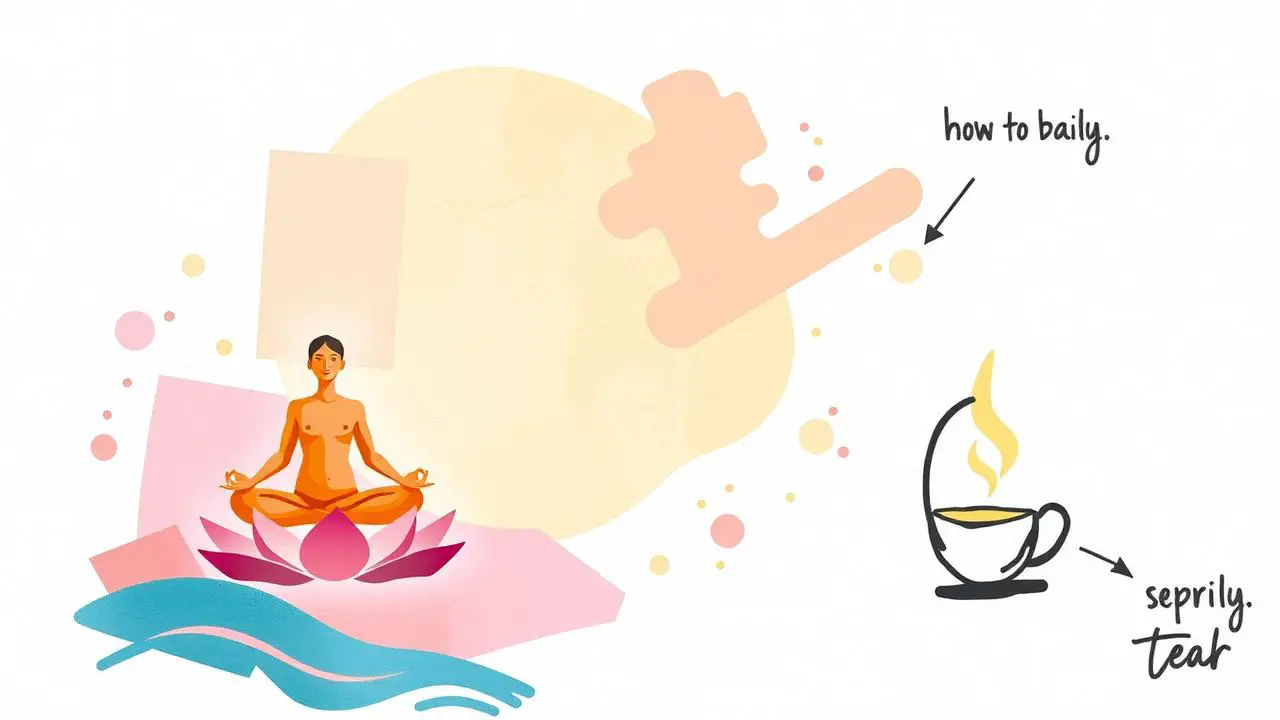Mindfulness is a practice of being present in the moment and focusing on your thoughts, feelings, and emotions.
It can be an incredibly powerful tool to help you become more aware of yourself and your surroundings.
One way to cultivate mindfulness is through mindful words. Mindful words are positive affirmations that can help you stay focused on the present moment and boost your overall wellbeing.
In this article, we’ll explore 10 mindful words that can help you improve your positive thinking and meditation practice in everyday life.
Table of contents
What is positive thinking?
Positive thinking is a way of looking at life with an optimistic and hopeful attitude. It involves focusing on the good, expecting the best to happen, and looking for the silver lining in any situation.
Through positive thinking, people can take control of their emotions and choose to respond with enthusiasm, joy, optimism and hope instead of anger or despair.
Practising positive thinking can help to increase self-esteem, reduce stress levels and improve overall well-being.
What are 10 mindful words to boost positive thinking and meditation?
Mindful words are a powerful tool to help cultivate mindfulness and boost positive thinking and meditation. ILet’s explore 10 mindful words that can help you stay focused on the present moment and improve your overall wellbeing.
1. Gratitude
The significance of gratitude in relation to positive thinking and meditation is clear. By practising gratitude, one can boost their feelings of happiness by being polite, deferential and gallant.
Additionally, paying compliments to others promotes consideration and politeness. These behaviours lead to better interpersonal relationships which then supports positive thinking and meditation.
2. Clarity
The significance of clarity in relation to positive thinking and meditation is important for the development of strong mental health.
Clarity of thought can bring about increased vigilance and care, which can lead to improved mental health through deliberate and mindful thinking.
Additionally, many practitioners find that mindful words used during meditation help to boost positive thinking and cultivate inner peace.
3. Presence
The practice of mindful meditation encourages greater presence and an appreciation for the present moment.
Presence is important in mindful meditation because it helps individuals to gain insight into their thoughts, feelings, and emotions without judgement. It enables people to become more aware of their environment, as well as their physical and mental states.
In addition, by helping people stay focused on the present moment, rather than thinking about the future, they can improve their concentration and productivity.
4. Compassion
Something we should all strive to be in the modern world, compassion plays an important role when it comes to positive thinking and meditation. It helps to reduce stress, increase resilience, improve relationships, promote productivity and well-being, and cultivate mental well-being.
Additionally, compassion can be used as a tool for developing emotional intelligence, mindfulness, motivation & goal setting skills, positive education approaches and practices, and positive communication strategies.
Furthermore, by recognizing their own strengths and virtues people are able to better appreciate the world around them.
All these elements combined serve to enhance the benefits of using compassionate approaches in relation to both meditation and positive thinking practices.
5. Acceptance
The word “acceptance” is an important word to encourage positive thinking and meditation. It helps us to know our true feelings and to respond to them positively.
By allowing ourselves the space to accept our present moment, we can better understand the motivations behind our thoughts and behavior, allowing for more meaningful action.
Through acceptance, we can also become aware of any biases that may be affecting us, so that they can be addressed mindfully.
Finally, acceptance helps foster self-compassion by encouraging an appreciation of ourselves despite any perceived imperfections.
6. Intention
In mindfulness and meditation, setting an intention is important because it can help people stay in control during difficult moments, increase creativity and inspire inner peace, and strengthen the connection between the lower and higher parts of the brain.
By setting goals and intentions for the day and checking in with themselves throughout it, people can better communicate their thoughts, stay motivated, improve their moods, cultivate their intellectual ability and develop meaningful relationships.
Mindful words such as “focus” or “trust” can also be used to boost positive thinking during meditation sessions.
7. Authenticity
The significance of authenticity in mindful thinking and meditation is that it allows for honest and open communication.
Authenticity encourages us to be aware of our own thoughts, feelings, and intentions in an honest and truthful manner.
This can help us maintain an uprightness during meditation or mindful thinking which can lead to positive results.
Additionally, being authentic helps us be more faithful to the goals we have set for ourselves while practicing mindfulness or meditating.
8. Equanimity
An uncommon word you may not have heard of, equanimity is the state of having a neutral and accepting attitude towards all situations.
Practicing equanimity can help boost positive thinking and meditation by reducing stress and anxiety. It allows one to witness the dance of life without falling into negative emotion, instead cultivating peace within oneself.
Mindfulness helps in this practice, as it encourages remembering to stay in this state through focusing on breathing or embracing loved ones.
Happiness can be found through cultivating equanimity, making it an important aspect of positive thinking and meditation techniques.
9. Stillness
When it comes to positive thinking and meditation, the importance of stillness is that it can help to reduce stress, improve concentration and mental health, and provide a sense of peace.
Practicing mindfulness can also be beneficial as it allows for awareness of what is happening which in turn aids with positive thinking.
In addition, techniques like relaxation and breathing exercises are key aspects of mindfulness. They can help the mind to focus on positivity and calm down.
10. Purpose
Purposefulness is included as one of the 10 mindful words because it helps to focus on a specific goal or intention. It also helps to boost positive thinking.
By being purposeful, individuals can achieve their goals more easily and smoothly, with fewer distractions.
You can help focus your purpose by setting intentions for the day and monitoring how moods and communications change throughout the day can help to boost positive thinking and meditation.

How can these words help with mindfulness and meditation?
Mindfulness and meditation are powerful tools for improving mental health, cultivating positive thinking, and achieving personal goals.
By incorporating mindful words into our practice, we can further enhance the benefits of mindfulness and meditation.
These words help to focus our attention on the present moment, allowing us to be more aware of our thoughts and feelings.
They also provide a sense of purpose and direction which can help us stay motivated and achieve our goals.
Ultimately, these mindful words can help us cultivate a more positive outlook on life and create meaningful relationships with ourselves and others.
1. Be present
Being present means being in the moment and paying attention to what is happening around you. To be present allows for mindfulness and meditation, which can lead to healthier choices.
Mindfulness means to focus on the present moment and enjoy what is going on. It also means to train the brain to focus on thoughts and feelings instead of external things.
Mindfulness can help with meditation and improve overall mental health while being simple to practice yet having a profound effect on life.
2. Live in the moment
Living in the moment means being present and focusing on what is happening right now. It involves accepting everything as it is, without judgment.
Mindfulness is the practice of being aware of the present moment, and it can be cultivated through mindfulness and meditation.
This practice can help us to control our thoughts and emotions, allowing us to live a more peaceful and productive life.
By practicing mindful awareness of our surroundings, we can train our minds to have healthier thought patterns which will improve how we view things around us.
3. Accept life as it is
Accepting life as it is can help with mindfulness and meditation by allowing the individual to become aware of what is happening in the present moment.
By being kind and compassionate, anxiety can be managed and stress can be reduced, leading to improved mental health.
An individual must also focus on contribution instead of competition, as this helps prevent their life from becoming a struggle.
Furthermore, they must accept those who do wrong or harmful things without hatred; instead, they must use compassion to try and stop them from harming others.
4. Let go of control
It is important to let go of control when practicing mindfulness and meditation because it allows the mind to experience greater freedom and a more relaxed state.
When one lets go of control while practicing mindfulness and meditation, they increase their awareness, give themselves more time to make choices, and create more space for growth.
Additionally, letting go of control can reduce stress levels and improve focus and concentration.
5. Follow your breath
By following their breath, individuals can help with mindfulness and meditation. By focusing on the sensations of breathing, one can become more present in the moment and gain a greater level of awareness.
This heightened self-awareness helps to reduce stress and anxiety levels, allowing for a more mindful experience when practicing meditation or other activities.
Breathing deeply also helps to regulate emotions, making it easier to stay focused on positive thoughts during meditation practice.
6. Acknowledge your emotions
It is important to acknowledge one’s emotions when practicing mindfulness and meditation because it helps to reduce stress and improve mental health.
Being aware of one’s own emotions allows for a better connection with oneself and one’s surroundings, which can lead to more informed decisions.
Moreover, acknowledging emotions can help reduce bias and improve emotional regulation.
Many people have written about their experiences with mindfulness practices. They have written about their experiences so that people can see how good these practices can do for them.
7. Practice non-judgmental awareness
Non-judgmental awareness is a practice that involves becoming aware of one’s thoughts and feelings without attaching any negative or positive emotions to them.
This attitude can create a more realistic and accepting view of the world, allowing for more effective action in the present moment.
Non-judgmental awareness is important for mindfulness and meditation as it helps to avoid judgmental thoughts and behaviours, which can reduce bias.
It also allows one to come back to themselves, see what is going on, and take better action in response.
Practicing non-judgmental awareness throughout the day can help with mindfulness and meditation by providing an opportunity for greater self-awareness in order to effectively make changes where needed.
8. Notice your thoughts
Noticing one’s thoughts can help with mindfulness and meditation by allowing the individual to become more aware of their thoughts and emotions.
This awareness can then be used to make better decisions, live in the present moment without getting overwhelmed by negative thinking, and break free from distracting thoughts.
Mindfulness exercises like body scan meditation can also help to focus on one’s experience instead of getting distracted or thinking about other things.
9. Cultivate gratitude
Gratitude is important in mindfulness and meditation because it helps individuals to focus on the present and appreciate the good aspects of their life.
Practicing gratitude also has many benefits for mental health, such as reducing stress, increasing resilience, promoting positive emotions, and improving self-awareness.
Additionally, cultivating gratitude can help people to develop emotional intelligence and build better relationships with others.
10. Use positive affirmations
Positive affirmations are statements of belief that can help improve mental health. They can promote cognitive function, boost positive thinking, and help with mindfulness and meditation.
By changing the thoughts that we focus on, positive affirmations can shift our attitude away from negative to more positive. This will lead to positive changes in your life.
With regular practice of using these words as part of daily affirmations or meditation, one can create a joyful destiny for themselves and increase their overall well-being.
11. Establish a daily meditation practice
Meditation has many benefits, both mental and physical. It can help to reduce stress and anxiety, improve concentration and focus, and increase overall wellbeing.
Mindfulness is a state of being in which you are aware of your surroundings as well as your thoughts.
Through daily practice of meditation, one can become more mindful which may lead to increased focus on tasks, better sleep patterns, greater insight into oneself and life in general, as well as an overall more peaceful life.
12. Take a break from technology
It is important to take a break from technology because it helps individuals to focus on what is important and avoid being overwhelmed.
Taking a break can help recharge the individual, allowing them to make better decisions and find new solutions.
Additionally, taking a break from technology allows the individual to reduce potential addiction and increase their productivity and health.
13. Connect with nature
Connecting with nature is beneficial for mindfulness and meditation because it provides an opportunity to take a break from work and be present in the moment.
Being outdoors can also help to engage one’s senses, which can increase focus and practice of mindfulness exercises.
14. Spend time with loved ones
Spending time with loved ones has been found to help with mindfulness and meditation practices, as it provides a sense of connection and comfort.
It allows for reflection on the past but also encourages openness to new perspectives by introducing someone new.
It provides an opportunity to challenge negative views of oneself or others and foster a more accepting attitude towards growth and change.
Lastly, spending time with loved ones helps one learn to love themselves in order to be able to truly love others.
15. Pursue meaningful activities
The pursuit of meaningful activities has a significant impact on one’s ability to practice mindfulness and meditation.
By engaging in these activities, individuals are able to become more aware of their thoughts, words and actions.
Additionally, meaningful activities can help foster a more stable brain state and align the heart rate and nervous system.
Through this kind of mindful engagement with physical activity, from something as simple as tying shoes to working out or challenging oneself with something faster or more difficult than usual, one can gain peace of mind by achieving a better sense of focus and presence in the moment.
16. Nurture your body
Nurturing one’s body has a range of benefits, including reducing stress and improving sleep. It can also help one lose weight, maintain muscle mass, and improve overall health.
Additionally, it can help to focus and relax the mind as well as increase one’s flexibility and mobility.
17. Engage in creative activities
Participating in creative activities can help people with meditation and mindfulness because they can break the “brain cycle” and allow more mindful thinking.
Creative activities can also enable a person to pause, creating an open doorway to the sacredness of a place.
Additionally, engaging in creative activities allows individuals to consciously make choices instead of relying on habitual thoughts or patterns.
18. Reflect on the journey
Reflecting on the journey can help individuals with mindfulness and meditation by providing an opportunity to look back on their past experiences and learn from them.
By reflecting on their journey, they can gain insight into how they were feeling or thinking at certain points of their life, and how this helped shape who they are today.
This reflection can also help bring clarity to current situations, allowing for more mindful decisions in the future.
19. Cultivate compassion
Cultivating compassion is an important part of mindfulness and meditation, as it helps to foster a more compassionate outlook on life.
Through regular practice of mindfulness and meditation, individuals can learn to be more mindful of their own thoughts and emotions and those around them.
Compassion can also help build healthier relationships with others, leading to improved emotional health and overall well-being.
Additionally, incorporating compassion into different areas such as coaching or therapy exercises can lead to more meaningful interactions with clients.
20. Embrace imperfection
It is important to embrace imperfection when practicing mindfulness and meditation as it helps with developing greater mindfulness and understanding of oneself.
Embracing imperfection allows practitioners to better connect with their emotions, solve problems, achieve goals and focus on the present moment.
Practicing mindfulness and meditation also helps reduce anxiety, creating a sense of peace and tranquillity.

What are the benefits of using these mindful words in daily life?
The use of mindful words in daily life can bring a range of benefits, from improving sleep and reducing stress to embracing imperfection and cultivating compassion.
Mindful words can help us become more aware of our thoughts, emotions, and actions, allowing us to make better decisions and live with greater intention.
By incorporating mindful words into our daily lives, we can create an environment that will help us lead healthier and more fulfilling lives.
1. Increase self-awareness
The purpose of increasing self-awareness is to gain insight into one’s own emotions, feelings, and behavior in order to better understand and manage them.
2. Improve focus and concentration
The benefits of using mindful words to improve focus and concentration are numerous. Mindful words can help reduce stress levels, allowing for a clearer mind, improving both mental and physical health over time.
Mindfulness is also useful in managing fatigue, which is often experienced by students who take on too much work.
Finally, mindfulness can be used to inspire calm and focus among students through the use of positive quotes and affirmations each day to help them remember to be aware and present.
3. Enhance creativity
Through mindful practice, one can experience improved creative input, greater inner peace and insight, invigorated involvement with one’s work, increased intentionality in creative endeavors and inspire others through its insights. Additionally, mindfulness can lead to improved rest and relaxation which is essential for improving creativity.
4. Enhance problem-solving skills
Mindful words help to enhance problem-solving skills by encouraging positive thinking and meditation. Through using mindful word searches, individuals can gain a greater sense of peace and clarity which in turn helps them to be better able to focus on problem solving.
Similarly, the quotes found in puzzles have been known to inspire and promote mindfulness which allows for more productive solutions when it comes time to tackle difficult problems.
5. Increase emotional intelligence
Mindfulness helps to increase emotional intelligence by allowing a person to disconnect between their faster, unconscious impulses in the lower brain centers and the slower, more conscious, wiser abilities of their higher centers.
Practicing mindful words can increase emotional intelligence by providing a way for people to connect with both their conscious and unconscious mind.
Through activities such as meditation and coaching, mindfulness practices help people become aware of their thoughts and feelings while setting an intention for each day.
By checking in with this intention throughout the day and using mindful words in everyday conversations and interactions, individuals can strengthen their connections between both brain centers while becoming more compassionate towards themselves and others.
As they become more aware of the impact their words have on others around them, they will be better able to manage difficult situations and emotions during any given day or week.
By doing so, emotional intelligence increases significantly over time as individuals become increasingly mindful about how they communicate with others.
6. Improve communication skills
Mindful words can help to improve communication skills by providing positive language and boosting one’s physical, mental, and emotional wellbeing.
By incorporating positive words into everyday talk, individuals can become more mindful of their speech and the impact it has on their environment.
This helps to foster greater clarity in communication while also improving cognitive function. A good place to start is by exploring a word list that includes each letter of the alphabet.
7. Develop resilience and coping strategies
The benefits of using mindful words to develop resilience and coping strategies include improved mental health, better stress management, and increased productivity.
Mindful words can help reduce stress and anxiety levels, improve focus, and enable individuals to step out of comparison cycles.
Additionally, it takes courage to be mindful and relax in the face of stressors. All of these factors can lead to enhanced resilience and improved coping strategies that work for an individual.
8. Improve physical health
Mindfulness has been found to have numerous physical benefits, including reducing job burnout, improving sleep, controlling diabetes, and helping to manage stress and anxiety.
Additionally, it can help reduce pain and depression while also aiding in the treatment of insomnia and hypertension.
Through mindfulness activities such as meditation, individuals are able to experience thoughts and emotions with greater balance and acceptance.
Furthermore, mindfulness can help one focus on their goals more efficiently in order to achieve them more successfully.
9. Enhance mental wellbeing
The benefits of using mindful words are numerous. Mindful words can help reduce stress and improve mental health, focus, and productivity.
They can also promote feelings of happiness and well-being through teaching mindfulness to others.
Additionally, mindful words can help increase awareness of the impact that our speech has on others.
10. Increase self-confidence
Research suggests that using mindful words can help increase self-confidence. Mindfulness helps to focus on the present moment and make good decisions, which can increase feelings of self-worth.
Different types of therapy, such as emotional intelligence and meditation, help to cultivate an individual’s mind and create an environment for positive thinking.
There are many strategies available to boost confidence, ranging from positive self-talk or affirmations to achievable goals.
11. Enhance decision-making skills
By practicing mindfulness, people can enhance their decision-making skills by being more present in the moment.
Mindfulness encourages individuals to focus on what is happening in the present and not allow past or future experiences to cloud their judgment.
Mindful words can help people practice this technique through therapy exercises, reading books or articles about mindfulness, and other methods.
This practice of mindful awareness will help one become more aware of their thoughts and feelings which can lead to better decisions.
12. Increase empathy
Mindful words can help increase empathy by making people aware of their own feelings and thoughts, and how they affect other people.
Through mindful words, individuals can connect with themselves on a deeper level, as well as better understand the perspectives of those around them.
Additionally, mindful words have been shown to reduce stress levels, improve mental health outcomes, and increase understanding between individuals.
Love poems can also help people remember how important love is in relationships, and nature can help us remember the beauty and fragility of life.
13. Foster positive relationships
Mindful words can help to foster positive relationships by promoting positive language, which has been proven to improve physical, mental, and emotional well-being.
When positive words are repeated regularly, they can reinforce feelings of connection and positivity that form the basis for successful relationships.
Also, using the alphabet and finding a list of positive words that start with each letter can be a great way to learn how to talk more carefully.
14. Enhance mindfulness
The benefits of mindfulness are numerous and include improved focus, concentration, and stress relief. Practicing mindfulness helps one to be aware of their surroundings and their own emotions, allowing them to better understand themselves and work through any issues they may be facing.
Additionally, its simple techniques such as paying attention to the present moment, accepting oneself as they are can help with creating a more peaceful and productive life.
Mindfulness is easy to practice by simply sitting down in a comfortable position with eyes closed while focusing on ones breathing.
This can be done anytime anywhere without equipment or tools which makes it an accessible way for anyone to improve their mental wellbeing.
15. Improve overall quality of life
Using mindful words to boost positive thinking and meditation can improve the overall quality of life by giving people a better sense of balance and how they feel.
Studies have shown that there are many potential benefits from incorporating meditation into one’s daily routine, such as improved attention, better sleep, increased emotional intelligence, better communication skills, increased motivation and goal achievement, better self-awareness and self-esteem, increased resilience to stressors in life as well as burnout prevention.
Mindful words can be used for a variety of purposes depending on the type of meditation chosen by an individual.
– Can Mindful Words Really Boost Positive Thinking and Meditation?
Mindful words have the power to elevate mindfulness and positive thinking. By choosing uplifting, compassionate language, we can enhance our meditation practice and encourage a more optimistic mindset. Incorporating mindful words into our daily life helps to foster a sense of peace and contentment.
How can you incorporate mindfulness into your routine?
Mindfulness is a powerful tool that can help us to better understand ourselves and our relationships with others. Incorporating mindfulness into our daily routine can have a profound effect on our mental, emotional, and physical wellbeing.
Let’s explore some simple ways to incorporate mindfulness into your daily life so that you can reap the many benefits it has to offer.
Read mindfulness quotes
It is important to read mindfulness quotes because they can help an individual focus on being in the present moment, reducing regret and fear.
Mindful words have been found to have a positive impact on mental wellbeing, providing motivation and inspiration.
Also, reading mindfulness quotes can be helpful for both professional and personal reasons because it can help you learn how to practice mindfulness through different exercises.
Educate yourself on how to stop a panic attack
Mindfulness is a technique of focusing on one’s thoughts and feelings, which has been found to effectively reduce symptoms of anxiety and depression.
It is particularly useful in reducing the intensity and severity of panic attacks, as it can help restore open monitoring and attention.
The popular mindfulness-based stress reduction (MBSR) approach is one way to help people reduce their stress and anxiety. This is done by focusing on what they feel instead of what they think.
Cook mindfully
One can cook mindfully by paying close attention to their physical sensations and hunger levels. Eating should be done according to one’s hunger level and peaceful eating techniques should be practiced.
Every bite should be tasted before it is eaten, with the pleasure that comes with it being noted. If the food is not to one’s liking, then it shouldn’t be eaten.
Mindful cooking involves slowing down when preparing meals and savoring each bite of food consumed. It also involves paying attention to the senses of taste, smell, sight, sound, and touch while cooking which can help reduce stress and improve mental health as well as reduce food waste and improve nutrition.
See: Mindfulness When Eating for Healthier Living
Download mindfulness tools
Mindfulness tools are important because they can help people focus and manage stress, improve concentration, and increase self-awareness.
They can also be beneficial to people of all ages, backgrounds, and abilities by helping them manage their thoughts and emotions in a healthy way.
Mindful practices such as paying attention to the present moment, living in the moment without judgment, focusing on one’s breathing or engaging in structured mindfulness exercises can provide an opportunity for greater inner peace and contentment.
Additionally, mindfulness tools have been shown to reduce stress and anxiety levels which may lead to improved physical health.
Find ways to discover the true you
Discovering the true self can help an individual better incorporate mindfulness into their routine. By understanding their own feelings and thoughts, they can better identify patterns that do not work for them, and find ways to deal with them.
With this newfound clarity, they can approach meditation with a clearer headspace. They can gain insight and greater self-awareness through a deeper exploration of themselves.
Additionally, developing mindful practices such as positive thinking helps individuals create meaning out of life’s experiences, leading to more fulfilling day-to-day activities.
Create mini-rituals you can do anywhere
One example of incorporating mindfulness into daily routine is to take a mindful break every day. This can be achieved by taking some time out to focus on the present moment and simply observe what is in that moment without judgement or analysis.
Another example is to practice meditation, which helps focus the mind and bring clarity of thought.
Additionally, eating slowly and mindfully can help improve one’s attention and appreciation of food, while listening to music mindfully can bring peace and relaxation.
Finally, spending time in nature allows one to reconnect with their natural surroundings while engaging all senses with awareness.
Monitor progress with your mindfulness practice
It is important for individuals to monitor their progress when practicing mindfulness, as this allows them to see how their efforts are paying off.
Monitoring progress allows an individual to identify any areas where further practice or support is needed to experience the full benefits of mindfulness.
Additionally, it can help motivate and encourage an individual as they work towards achieving personal goals related to their mindfulness practice.
Participate in uplifting puzzles
Uplifting puzzles can help with mindfulness by providing a mental break from the everyday and helping people to focus their minds.
Additionally, naming and recognizing the sensations that come with puzzles can lead to a more awake and alive state of mind.
This can be beneficial for achieving mindfulness while also learning new skills such as concentration, relaxation, and clarity of thought.
Sources




